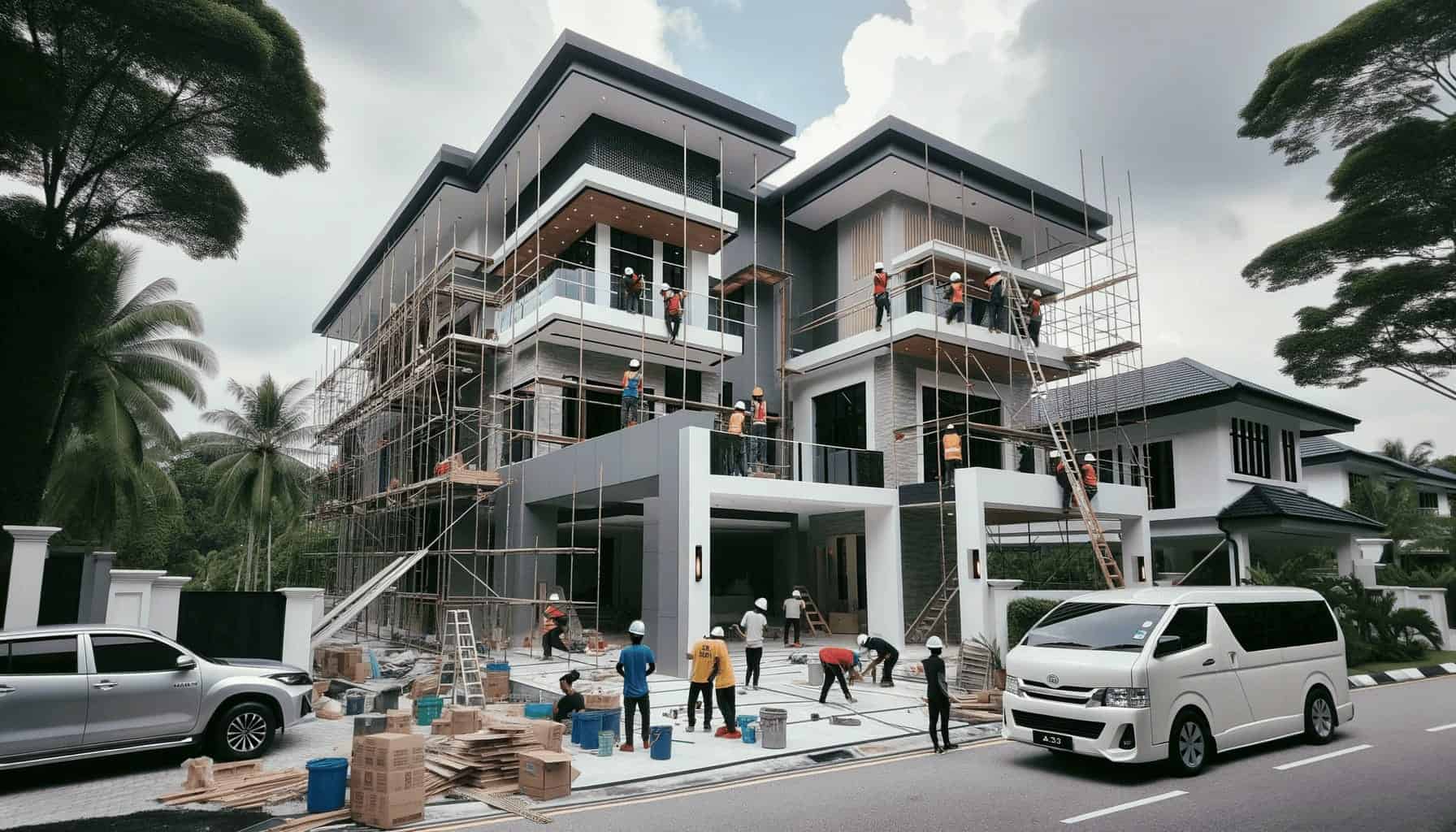- Bina Rumah Batu-Bata
- Zero Deposit
- Spesifikasi Rumah
- Lokasi Projek
- Pembiayaan LPPSA
- Garis Panduan LPPSA (Rasmi)
- Soalan Lazim LPPSA
- E-Book LPPSA (Download)
- 1. Apa itu LPPSA?
- 2. Kelebihan LPPSA
- 3. Syarat Kelayakan
- 4. Jenis-Jenis Pembiayaan
- Jenis 1 – Pembelian Rumah Kediaman Yang Telah Siap
- Jenis 2 – Membina Rumah Di Atas Tanah Sendiri
- Jenis 3 – Membeli Rumah Kediaman Yang Sedang Dibina
- Jenis 4 – Pembelian Tanah Bagi Pembinaan Rumah
- Jenis 5 – Melunaskan Keseluruhan/ Sebahagian Pinjaman Sedia Ada Daripada Bank/ Institusi Kewangan
- Jenis 6 – Pembinaan Rumah Kediaman Di Atas Tanah Yang Sedang Dibiayai Oleh BPP/ LPPSA
- Jenis 7 – Ubah Suai Rumah Yang Sedang Atau Telah Selesai Bayar Melalui LPPSA
- 5. Semak Kelayakan LPPSA
- 6. Dokumen Yang Diperlukan
- 7. Insurans/ Takaful LPPSA
- 8. Kos Yuran Guaman
- 9. BONUS: Bina Rumah
- Pembiayaan Koperasi
- Pengeluaran KWSP
- Bayaran Tunai
- Kalkulator
Building Your Dream Home on a Budget: The Complete Guide from A to Z

Building Your Dream Home on a Budget: The Complete Guide from A to Z
1. Introduction: The Importance of Building a Home on a Budget
Building a house is not an easy thing. It requires careful planning, accurate material selection, and most importantly, careful budget management. In this article, we will discuss in detail the importance of building a house on a budget and how it can affect your decisions in the home building process.
What is a Budget in the Context of Home Construction
Budget in the context of home construction refers to the amount of money you set aside to cover all the costs involved in the construction process. This includes the cost of building materials, labor wages, fees to architects, and more. Setting a realistic budget is the first step in ensuring your construction project runs smoothly.
Why Building a Home on a Budget Is Important
- Avoiding Financial Damage : Without a proper budget, you may face serious financial problems. This can cause your project to be delayed or have to be stopped completely.
- Ensuring Quality : With a good budget, you can choose quality materials and services. This will ensure that your home is durable and comfortable to live in.
- Reduce Stress : Building a house is a tiring process. With an organized budget, it will be easier to manage all aspects of construction and this will indirectly reduce stress.
- Time Efficiency : Knowing your budget allows you to make decisions more quickly and efficiently. This helps speed up the construction process.
- Clarity in Planning : A good budget will give you a clear picture of what can and cannot be done, helping you plan better.
For more information on the house building process, you can refer to our FAQ or contact us with any questions.
2. Basic Steps in Building a House on a Budget
Building a home on a budget is not an easy task, but with the right planning, it can be easier and more efficient. Below are some basic steps that can help you in this process.
Preliminary Research
Before starting anything, do some preliminary research on the type of house you want, the cost of building materials, and even the cost of labor. You can refer to our project locations to get an idea of the type of house and the costs involved.
Setting a Budget
- Identifying Financial Sources : Determine where your financial resources will come from. This can include personal savings, loans from banks, or government loans LPPSA .
- Calculating Costs : Use the bank’s financing eligibility calculator to calculate how much you need and how much you can afford.
- Additional Budget : Always prepare an additional budget to cover any needs or emergencies that may arise.
Planning the Construction Phase
- Foundation Construction : This includes earthworks, site construction, etc. Make sure you choose a home contractor who has experience in this field.
- Structure Construction : This is the phase where the basic structure of the house is built. This includes walls, roofs, and floors.
- Installation and Finishing : This is the final phase where all the installation is done including electrical, plumbing, and paint.
- Final Inspection and CCC Certificate : Before submitting the project, make sure you get the CCC Certificate (Certificate of Completion and Compliance) as proof that your house has been fully completed and complies with all standards.
By carefully planning each phase of construction, you will not only save money but also time and energy. For more information, you can refer to our IBS panel advantages or contact us with any questions.
3. The Importance of Knowing the Land Status Before Building a House
Before starting a construction project, one of the often overlooked but very important aspects is knowing the status and type of land where you will build the house. Soil is the foundation of every structure, and understanding it well is the key to building a strong and durable home.
Types of Land and their Importance
- Clay : This type of soil has high water absorption but is less suitable for construction because it can expand and shrink.
- Sandy Soil : More suitable for construction but requires additional structural reinforcement.
- Peat Soil : Less suitable for construction and requires special treatment before construction can begin.
- Rocky Land : Ideal for construction but requires expensive logging.
Process of Obtaining Approval from PBT
- Application for Approval : You need to apply for approval from the Local Authority (PBT) before starting the project. You can refer to the list of PBT in Selangor for more information.
- Land Inspection : Before getting approval, a land inspection will be conducted to determine the eligibility of the construction site.
- Payment of Taxes and Fees : After getting approval, you need to pay taxes and fees imposed by PBT.
- Monitoring by PBT : Throughout the construction process, PBT will conduct several inspections to ensure that all guidelines and standards are followed.
Knowing the status of the land and obtaining approval from the local authority are important steps that will ensure your construction project runs smoothly and on schedule. For more information, you can refer to our IBS panel installation or contact us for any questions.
4. Appointment of an Architect: Why is it Important?
In the journey of building your dream home, one of the most important decisions to make is choosing the right architect. Architects are not only responsible for planning the design of your home, but also play an important role in ensuring that the project runs smoothly from start to finish.
The Architect’s Role in Helping You Build a Home
- Planning and Design : Architects will help you design a house plan that suits your needs and tastes. This includes choosing materials that are suitable and efficient in terms of cost.
- Project Monitoring : Apart from planning, the architect will also monitor the progress of the project to ensure that all aspects go according to plan.
- Adherence to Standards : The Architect will ensure that all construction guidelines and standards are adhered to, including approval from the Local Authority (PBT) .
- Problem Solving : If a problem or challenge arises during the construction process, the architect is the first person who will look for a solution.
How to Choose the Right Architect
- Portfolio : Check the architect’s portfolio to assess the quality of their work. This will give you an idea of their style and abilities.
- Reviews and Testimonials : Read reviews and testimonials from previous clients to know the reputation of the architect.
- Personal Approach : Communication is key. Make sure you feel comfortable and able to communicate well with the architect you choose.
- Estimated Cost : Make sure the architect you choose offers services that fit your budget. You can use our home loan calculator to help you plan your budget.
Choosing the right architect is one of the decisions that will affect the entire process of building your home. For more information, you can refer to our house specifications or contact us with any questions.
5. Contractor Selection: Tips and Guide
After planning and obtaining approval, the next step in building your dream home is choosing the right contractor. The selection of a contractor is one of the factors that will determine the success of your project. Here are some tips and guides that can help you in this process.
Contractor Selection Criteria
- Experience and Ability : One of the most important factors in choosing a contractor is their experience and ability in the field of construction. You can refer to our home contractor to know more.
- Reputation and Reviews : Research the contractor’s reputation through reviews and testimonials from previous clients. This will give you an idea of the quality of their work.
- License and Certificate : Make sure the contractor you choose has a valid license and certificate from the relevant authorities, including CIDB (Malaysian Construction Industry Development Board).
- Prices and Estimates : Compare the prices offered by several contractors and choose the one that best fits your budget.
Price Comparison and Work Quality
- Getting Quotes : Before making a decision, get quotes from several contractors for comparison. You can use our bank financing eligibility calculator to help you.
- Cost and Benefit Analysis : Apart from the price, also consider the quality of the work and the materials that will be used. Sometimes, paying a little more for better quality is a wise choice.
- Contracts and Terms : Make sure all terms and conditions are written in the contract and read carefully before signing.
Choosing the right contractor is key to ensuring your home construction project runs smoothly and on schedule. For more information, you can refer to IBS panels vs bricks or contact us for any questions.
 6. Capital and Loans: Options and Advantages
6. Capital and Loans: Options and Advantages
Building a house is a project that requires sufficient financial resources. Therefore, understanding the available capital and loan options is important to ensure you have sufficient funds throughout the construction process. Below are some options and advantages that you can consider.
Types of Loans Available
- Personal Loans : These loans usually have a higher interest rate but the approval process is faster.
- Home Loan from Bank : This is the most common option. You can use our home loan calculator to find out your eligibility.
- Loan from Public Sector Housing Finance Board (LPPSA) : This is a good option for government employees. You can refer to our LPPSA government loan for more information.
- Equity : If you have enough savings, this is the best option because you don’t have to pay interest.
Advantages and Disadvantages of Each Loan Option
- Personal loan
- Advantages : Fast process, less documents.
- Disadvantages : High interest rates.
- Housing Loans from Banks
- Advantages : Lower interest rate, higher loan amount.
- Disadvantages : Strict approval process, requires a lot of documents.
- Loan from LPPSA
- Advantages : Low interest rates, more relaxed eligibility requirements.
- Disadvantages : Only open to government employees.
- own money
- Advantages : No interest, more freedom in fund management.
- Disadvantages : Risk of lack of funds if not well planned.
Understanding these options and advantages will help you make more accurate decisions about the financial resources for your home construction project. For more information, you can refer to our bank financing eligibility calculator or contact us with any questions.
7. Calculate and Save House Building Costs
Building a house is a big investment, and one of the biggest challenges faced by homeowners is how to calculate and save costs. In this section, we will discuss some methods and strategies to help you in this regard.
Costing Method
- Quotation from the Contractor : This is the most accurate method. You can refer to my quotation to get a quote from us.
- Cost Calculator : There are various types of house building cost calculators that can help you roughly estimate the cost. You can use our bank financing eligibility calculator as a guide.
- Consulting with Experts : Consulting with experts in the construction field can also give you a more accurate cost estimate.
Cost Saving Strategies
- Buying Materials in Bulk : Buying building materials in bulk is usually cheaper and can help you save money.
- Using Alternative Materials : There are alternative materials that are cheaper but still of good quality. For example, using IBS panels instead of traditional bricks.
- DIY (Do It Yourself) : For easier jobs, you can do it yourself to save costs.
- Price Comparison : Always compare prices from several sources before making a purchasing decision.
- Avoiding Waste : Plan carefully to avoid wasting materials and resources.
By understanding calculation methods and cost-saving strategies, you will be more confident in managing the budget for your home construction project. For more information, you can refer to our house building costs or contact us for any questions.
8. Importance of Insurance and Warranty in Construction Projects
Insurance and warranty are two elements that are often taken for granted but have great importance in ensuring the success and sustainability of your home building project. Below are some points that explain the importance of both.
Types of Insurance in Construction
- Contractor’s Insurance : Protects you from any financial loss that may arise due to the failure or bankruptcy of the contractor.
- Fire and Property Damage Insurance : Protects your home from fire, flood, and other natural disasters.
- Performance Guarantee Insurance : Guarantees that the contractor will complete the project according to the specifications that have been set.
Advantages of Having a Warranty
- Peace of Mind : The warranty gives you peace of mind knowing that any defects or problems that arise will be fixed.
- Increase Resale Value : Homes with warranties usually have a higher resale value.
- Reduced Repair Costs : With a warranty, the cost to repair or replace damage is minimal or non-existent.
Tips for Choosing an Insurance and Warranty Package
- Understanding Terms and Conditions : Read all terms and conditions carefully before purchasing an insurance policy or accepting a warranty.
- Compare Options : There are many insurance and warranty packages on the market. Compare and choose the one that best suits your needs.
- Consult an Expert : If you are unsure, consult an insurance or warranty expert for more accurate advice.
Understanding the importance of insurance and warranty will help you make more accurate and informed decisions in your home construction project. For more information, you can refer to our FAQ or contact us with any questions.
9. Home Handover and Final Inspection Process
After months of planning and construction, it’s time for the handover process and the final inspection of the house. This is the last but very important step in ensuring that all aspects of your home are finished to perfection and to specification.
Steps in the Submission Process
- Preliminary Inspection : Before handover, a preliminary inspection will be carried out by the contractor and the home owner to ensure that all work has been completed.
- Documentation : All relevant documents, including the approval certificate from the Local Authority (PBT) , will be submitted.
- Final Payment : Final payment will be made once all inspections and documentation are complete.
- Handover of Keys : This is the last step where the house keys will be handed over to the home owner.
Importance of Final Inspection
- Ensuring Quality : The final inspection ensures that all materials and construction work are of high quality.
- Security : Ensure all security systems, including security doors , work properly.
- Customer Satisfaction : This is the last chance to make sure all your needs and wants as a homeowner have been met.
Tips for Final Inspection
- Checklist : Make a checklist to make sure you don’t miss anything during the inspection.
- Ask for an Expert Opinion : If necessary, bring an expert or architect during the inspection to get a professional opinion.
- Don’t Rush : Take enough time during the inspection and don’t rush to sign any document.
The submission process and final inspection are the final steps that will determine your satisfaction with the home construction project. For more information, you can refer to contact us for any questions.
10. Steps After Handover of House
Once the submission and final inspection process is complete, it’s time to think about the next steps. Although you may feel relieved, there are still some things that need to be taken care of to ensure that you can really enjoy your new home.
Registration and Legal Affairs
- Title Registration : This is the first and very important step to ensure your home is registered under your name.
- Tax Payment : Don’t forget to manage property tax payment and other related fees.
- Utility Transfer : Make sure all utilities such as electricity, water, and gas have been transferred to your name.
Maintenance and Repairs
- Regular Inspections : Even if the home is new, it is a good idea to have regular inspections to ensure all systems are functioning properly.
- Maintenance Plan : Create an annual maintenance plan to ensure your home stays in good condition.
- Repairs and Improvements : If there are any deficiencies or desire to make improvements, this is the right time to do them.
Enjoy Your New Home
- Decoration and Interior Decoration : Now is the time to show your creativity in decorating the house.
- Open House : Consider holding an open house to introduce yourself to the neighbors and enjoy your new home.
- Rest and Relax : After all the effort and planning, it’s time for you to relax and enjoy the fruits of your hard work.
By understanding the steps to take after handing over the house, you will be better prepared to start a new life in your dream home. For more information or any questions, do not hesitate to contact us .
 Conclusion
Conclusion
Building a home is a journey that requires planning, commitment, and serious effort. From the initial planning stage to the final handover, every step requires attention and accurate decisions. We hope this article provides you with a comprehensive and useful guide on your journey to building your dream home. If you have any questions or need further assistance, please contact us .
Thanks for reading, and we wish you the best of luck with your new home!
























